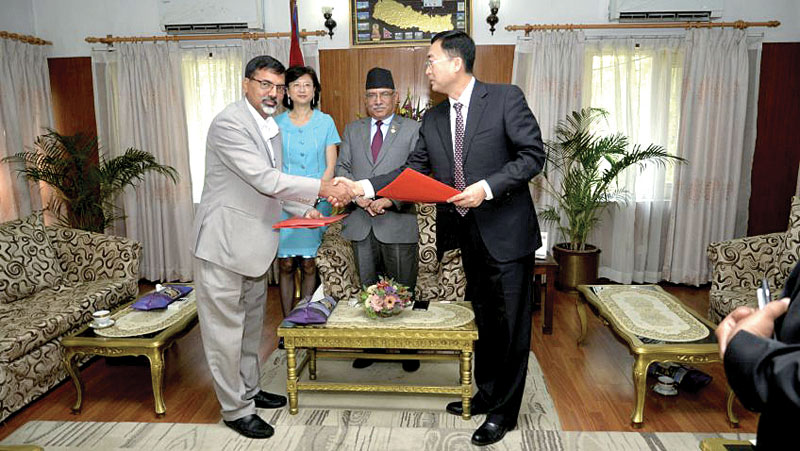Former PM asks govt to scrap Budhigandaki deal
Kathmandu, June 8
Former prime minister and Coordinator of Naya Shakti Party Baburam Bhattarai has alleged that the previous Pushpa Kamal Dahal-led government violated the prevailing laws and processes while awarding the contract of Budhigandaki Hydroelectric Project to Chinese company — China Gezhouba Group Corporation (CGGC) through the last Cabinet meeting and signed the memorandum of understanding (MoU) as the care-taker government at the very last moment.
He has also urged the government to scrap the contract with Chinese company and develop the project utilising its own resources.
The Dahal-led government’s decision on Budhigandaki will be major setback for the of the 1,200-megawatt reservoir project as it has brought to the fore the uncertainty of project development and chances of cost variation, as per Bhattarai.
Bhattari, when he was the prime minister in 2011, had initiated to develop Budhigandaki as national pride project. For this, he had also set up a special purpose vehicle — that is, a development committee — to execute the project.
The Budhigandaki Hydroelectric Project Development Committee (BGHEP) has already carried out detailed design of the project through Tractebel Engineering (France), which has estimated it would cost around Rs 260 billion to build the project. The BGHEP has also already prepared the tender document to award the construction contract.
“We planned to develop this project as a national pride project considering that it is strategically located near major load centres — Kathmandu, Chitwan, Pokhara — and its potential to be developed as an economic hub,” said the former prime minister. “For a country that is developing the 456-megawatt Upper Tamakoshi Hydroelectric Project on its own, Nepal also has the capacity to develop the Budhigandaki Project with its own resources, whereby Nepalis could feel a sense of ownership.”
However, the previous government has handpicked the CGGC to develop the project under engineering, procurement, construction and financing (EPCF) model. Since Nepal is yet to formulate the policies or guidelines related to EPCF contract, the government’s decision has put the fate of the mega project in limbo, Bhattarai claimed.
Bhattarai was also apprehensive about the CGGC’s capacity to implement such a large-scale project, considering that it has taken over a decade to complete the 30-megawatt Chameliya Project. CGGC was blacklisted in Sanjen Hydropower Project. Chilime Hydropower Project had terminated the construction contract and seized the collateral from CGGC.
Another project, the 60-megawatt Trishuli 3A being developed by the same contractor was initially supposed to be completed by June 30, 2011. The deadline has already been extended thrice — first to April 30, 2013, then by 26 months to June 30, 2016 and then again for another 34 months since the last deadline.
“The company has a very bad reputation in the country, and yet the earlier government awarded the EPCF contract of Budhigandaki to CGGC, which must be scrapped as soon as possible,” Bhattarai said, adding, “The project should be built utilising Nepal’s own resources, labour and skills and the rehabilitation works should also be carried out immediately along with distribution of land compensation.”






